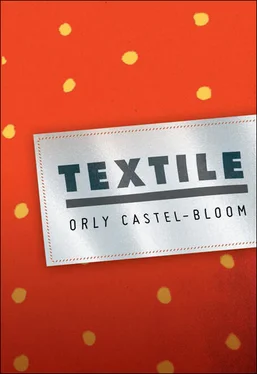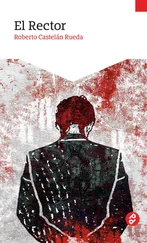Clearly people in the top 10 percent would buy them for the use of their offspring, and maybe the 30 or 40 percents below that too. People would buy them as gifts for baby showers too, if the babies were dear to them.
Yes, why not? Lirit mused, and nearly missed the turnoff, but managed to change course in time, though fortunately for her there were no traffic cops or cameras in the vicinity. Pajamas from organic cotton! She began racking her brains for slogans for a future advertising campaign. And perhaps not only for infants? She expanded her plans. For all ages! Yes. Why discriminate against the parents? Lirit let her thoughts range far and wide: first she would put out a line of pajamas for infants from organically grown cotton, and later on the same thing for all ages, under the slogan, “Why shortchange the parents?” She already had a vision of what an advertising campaign for both items at once would look like: Give them to your children and also to Mom and Dad and Granny and Grandpa, who gave their all to their children. .
Today, said Lirit to herself, people take great care of their bodies and their health because of the security situation in the world, not only in Israel. The more the security situation deteriorates, the more people will invest in sporting appliances, vitamins, nutritional supplements, organic vegetables, and organic cotton.
She remembered that a year ago she had been on a shopping expedition with Mandy at the up-market Ramat Aviv mall. They both tried on bras, and nothing felt comfortable. Mandy said that all the bra manufacturers should be forced to use organic cotton in their products so that they wouldn’t scratch people.
“You and I are actually in the same position as far as gravity is concerned,” Mandy said to her on the same occasion, having just undergone breast-lifting surgery.
After they had each bought two bras, and they went down to the underground parking garage, they heard people in the elevator talking about some new outrage that had taken place an hour ago. Mandy was stressed out until she extracted the information vital to her from the passengers in the elevator: the casualties were civilian.
“I don’t even care about civilians anymore,” she said when they got out of the elevator, “only about soldiers. You know?” she looked at her nodding daughter. “About children and babies I don’t feel anything anymore. I don’t want to know anything about them. Not four year olds and not one year olds. Or one month. But when a soldier dies, I die. I think about his mother. Naturally after I find out that I’m not his mother. If it happens to my son, I’ll kill myself on the spot. I’m sure a lot of mothers feel the same way. My life’s not worth living without Dael.”
“And without me is your life worth living?”
“You’ll manage very well without me,” said Mandy and pressed the remote that opened with a shriek the car whose beauty stood out even among the cars of the shoppers at the Ramat Aviv mall.
“And Daddy?”
“Your father doesn’t need anyone,” said Mandy and made her way through the parking garage to the exit to Einstein Street.
She dawdled a bit, because it was their old neighborhood, and they even passed their old house at 44 Tagore Street, and sat and looked for a moment at the place where they used to live, and then they continued driving east on Keren Kayemet Avenue.
While Lirit was remembering all the above, Bahat was trying to call her, but Lirit didn’t hear the ring because she was playing a tape very loudly to herself. The radio had been tuned to a station playing Hebrew songs, but Lirit had soon put a stop to that.
Accordingly, Bahat was obliged to remain with the facts seething inside her, without an outlet in Israel.
She wanted to complain to Lirit, or anyone, about the phenomenon of Gruber, and she wanted to demand that Lirit come and get him. No, enough was enough, she couldn’t stand him anymore.
It was the little things that broke her. Gruber left the bathroom in a disgusting state, even if he only went in to brush his teeth and comb his hair. He behaved as if seven chambermaids were following him around wherever he went. And in the toilet, the way he urinated annoyed her. It was many years since she had had to clean leftover urine from the toilet bowl. And now that she had to do it again, she felt great annoyance.
The man, it turned out, raised the toilet seat, but failed to lower it again, and sometimes, albeit rarely, he didn’t even take the trouble to raise it, and this, in her opinion, was the height of chutzpah. Who did he think he was, an animal? He finished the toilet paper and didn’t change the roll. And he still had the nerve to argue that Mandy had allowed him not to change it, because he had trouble with the spring. What kind of an argument was that? Was that the way he behaved with his wife, or did he think that his wife’s laws were valid for her as well?
She began to detest the guest more and more, and he, for his part, grew more and more demanding and dependent, and was convinced that everything he did stemmed from his outburst of feelings for Bahat. All this was not at all what the enthusiastic Reform rabbi had in mind. The prayer shawl, and the big skullcap, which she hadn’t yet decided whether to wear or not, were in a drawer in her closet, folded up.
For three nights now she had been sleeping in the rarely used guest room, while he lay sprawled on her comfortable bed. He sweated so much at night, because of the objective situation, that she was obliged to change his sheets every day. He asked to be involved in the choice of sheets, because he claimed that Bahat’s bed linen was depressing.
She was also repelled by his negligence, by his failure to return to Israel with the information she had given him in order to continue his experiments with the requisite urgency. Every day that passed claimed more victims who could have been saved if he hadn’t thought only of himself, and she patted herself on the shoulder, noting that her thoughts were becoming more and more moral.
From time to time he said to her, “I love you,” in English. And also “I love you very much.” It was impossible to tell anything from these declarations because they were in blatant contradiction to his behavior. It was clear to her that he had completely freaked out, and she only hoped that his love would be short-lived, like that of the Hispanic Salazar: two weeks of sensual intoxication, and after that as if nothing had happened, coolness lacking in tension, but empathy and outstanding efficiency.
Bahat had a theory that her latest discoveries about the silk protein were made possible by spare libido, at least on her part. As for Salazar, she had no idea what motivated him, but his ideas were brilliant.
In the end she despaired of her attempts to contact Lirit and she decided to take things into her own hands. As long as the seven days of mourning for his wife lasted (Gruber began the shivah from the moment he was informed of her death), she would show restraint. After that she would assert herself.
ON THE NIGHT BETWEEN THE SIXTH AND SEVENTH DAY of mourning, Gruber wet the bed. Since Bahat was sleeping in the guest room she was spared the direct experience, although he did call her in the middle of the night to change the sheets.
As far as Bahat was concerned this was a sign to phone a psychiatrist and request an urgent home visit. The effort of persuading the squatter to leave the house and go to the psychiatrist’s office seemed to her an investment of energy that she needed for herself and which she wasn’t about to put at Gruber’s disposal, not even out of philanthropy.
She opened the Ithaca Yellow Pages and looked up the number of the well-known medical center of the town. There she obtained the name of a psychiatrist who she assumed, like every other psychiatrist in the world, received private patients as well. She spoke to his secretary at his official place of work and found a pretext for getting his home and cell phone numbers out of her.
Читать дальше












